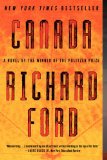Summary | Excerpt | Reading Guide | Reviews | Beyond the book | Read-Alikes | Genres & Themes | Author Bio

A Novel
by Howard NormanSeventeen-year-old Wyatt Hillyer is suddenly orphaned when his parents commit suicide, causing him to move to a small-town, and setting in motion the novel's chain of life-altering passions, including the fathering of a beloved daughter.
Howard Norman, widely regarded as one of this country's finest novelists, returns to the mesmerizing fictional terrain of his major books--The Bird Artist, The Museum Guard, and The Haunting of L--in this erotically charged and morally complex story.
Seventeen-year-old Wyatt Hillyer is suddenly orphaned when his parents, within hours of each other, jump off two different bridges--the result of their separate involvements with the same compelling neighbor, a Halifax switchboard operator and aspiring actress. The suicides cause Wyatt to move to small-town Middle Economy to live with his uncle, aunt, and ravishing cousin Tilda.
Setting in motion the novel's chain of life-altering passions and the wartime perfidy at its core is the arrival of the German student Hans Mohring, carrying only a satchel. Actual historical incidents--including a German U-boat's sinking of the Nova Scotia-Newfoundland ferry Caribou, on which Aunt Constance Hillyer might or might not be traveling--lend intense narrative power to Norman's uncannily layered story.
Wyatt's account of the astonishing--not least to him-- events leading up to his fathering of a beloved daughter spills out twenty-one years later. It's a confession that speaks profoundly of the mysteries of human character in wartime and is directed, with both despair and hope, to an audience of one.
An utterly stirring novel. This is Howard Norman at his celebrated best.
Howard Norman is a master storyteller, packing provocative details into virtually every sentence of this short, but hardly slight, novel. Secondary characters, including the bakery owner, an aspiring stenographer, and a record collector, are depicted as quirky but utterly human. Likewise, the details of life in Middle Economy, including Tilda's aspirations to become a professional mourner, Donald's increasing obsessions, and Wyatt's attempt to master a craft, are simultaneously slightly off-kilter and completely sympathetic...continued
Full Review
(499 words)
This review is available to non-members for a limited time. For full access,
become a member today.
(Reviewed by Norah Piehl).
Although Donald's growing suspicions about Hans Mohring and other Europeans cross the line into obsession, some American readers may be surprised to learn just how active German U-boats were in Canadian waters during World War II. (U-boat is the anglicized version of unterseeboot, meaning undersea boat, i.e. a submarine).
During 1942, the German military mounted a series of strategic attacks on individual ships in the waters off the coast of Canada. These submarine attacks were intended to break up the formation of convoys and to disrupt the potential of North American naval activity in European waters. Because Canada had already committed a large proportion of their forces to fight overseas and their warships to escort ...
This "beyond the book" feature is available to non-members for a limited time. Join today for full access.

If you liked What Is Left the Daughter, try these:

by Richard Ford
Published 2013
A true masterwork of haunting and spectacular vision from one of our greatest writers, Canada is a profound novel of boundaries traversed, innocence lost and reconciled, and the mysterious and consoling bonds of family.

by Sarah Blake
Published 2011
The Postmistress is an unforgettable tale of the secrets we must bear, or bury. It is about what happens to love during wartime, when those we cherish leave. And how every story - of love or war - is about looking left when we should have been looking right.